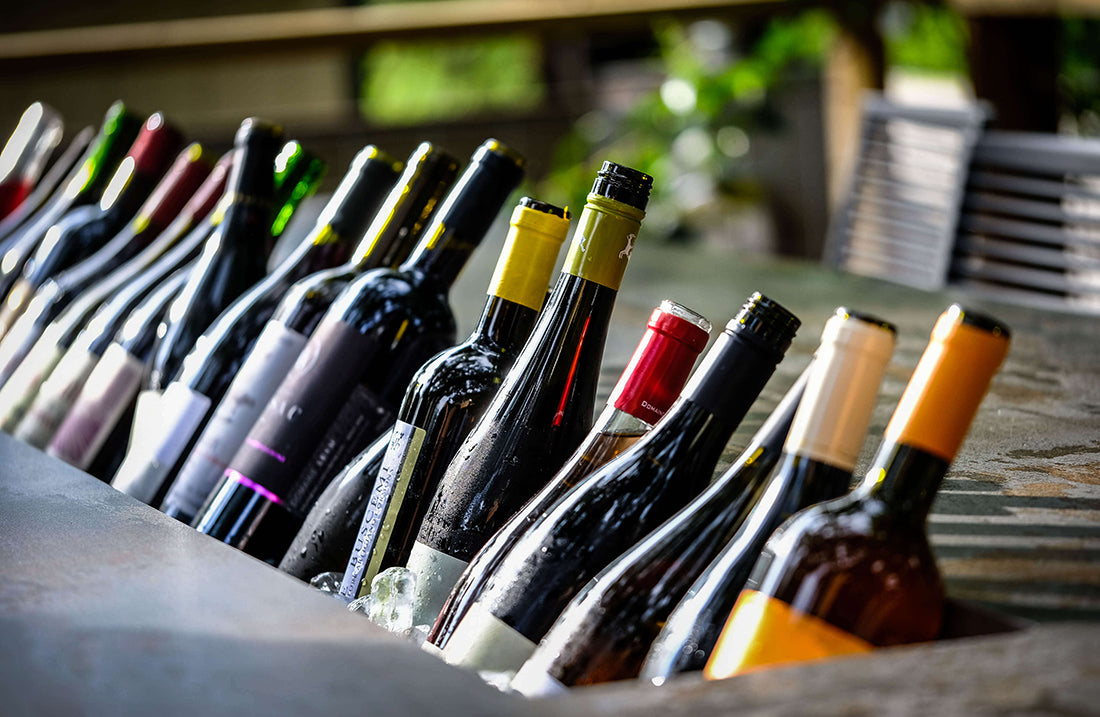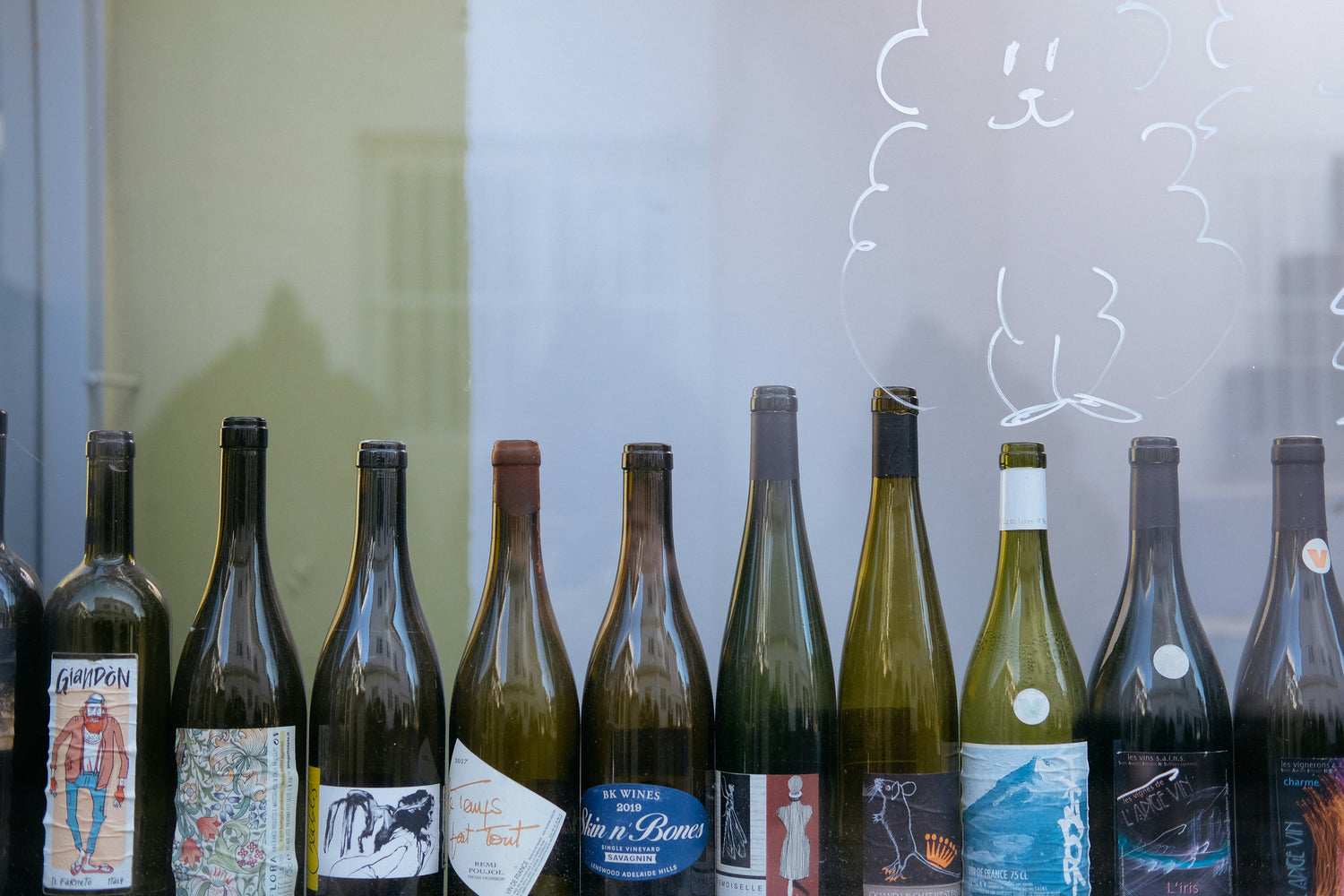
What's Really Inside Your £20 Natural Wine?
gregory Kinsman-ChauvetShare

Ever picked up a wine bottle and wondered what you're paying for? Here's something that might shock you - in a typical £5 bottle from your local shop, only 31p goes toward the wine itself. Yes, you read that right! The rest? A whopping £3.06 disappears straight into taxes. 😮
But natural wine tells a different story.
While big commercial wineries cut corners to keep prices low, small independent vineyards craft wines following an 8,000-year-old tradition. There are no additives or chemicals—just pure, honest winemaking.
✅ Small-batch production ✅ Chemical-free farming ✅ Traditional methods ✅ Real winemaker care
Ready to discover what makes your £20 bottle of natural wine unique? Let's peek behind the curtain and show you why choosing quality over quantity isn't just better for your health—it's also supporting passionate winemakers who pour their heart into every bottle.
The True Price of Your Natural Wine 🍷
"Wine is a living liquid containing no preservatives. Its life cycle comprises youth, maturity, old age, and death. When not treated with reasonable respect, it will sicken and die." — Julia Child, American cooking teacher, author, and television personality
Let me share something that might surprise you about natural wine prices. Your money goes to much more than just the liquid in your glass.
Breaking Down the Basic Costs
The packaging alone? More than you'd think! A box with protection for 12 bottles costs £3.14, while an 18-bottle box sets us back £5.16 [11]. These costs ensure your precious wines arrive safely at your door.
Then there's the tax story. 😩
The UK hits wine pretty hard:
- Wines between 11.5%-14.5% ABV pay £2.67 per bottle [11]
- Plus 20% VAT on top
- From February 2025, 14.5% ABV wine will see its duty jump from £2.67 to £3.21 - a 20% increase! [11]
Shipping? Add another £12.75 for customs paperwork [11], plus weekly changing delivery fees.
The Real Value of Your Wine
Here's the shocking truth: Half of a £9 bottle at 13.5% ABV goes straight to tax [11]. Buy a £7 bottle? Taxes eat up 60% [11]. That leaves almost nothing for the actual winemakers.
Some exceptional natural wines might seem expensive, but remember - these come from small vineyards, crafted by people who've spent years perfecting their art.
Why Natural Wine Costs More (And Why It's Worth It!)
Natural winemaking faces real challenges:
- 20% smaller harvests (40-45 hectoliters per hectare vs 50) [4]
- More hands-on work, fewer machines [4]
- 28% higher production costs than regular wine [9]
- Organic certification: £794-£3,971 per vineyard [12]
The truth? Better to enjoy one glass of real wine than a bottle of chemical soup. Your body will thank you, and you'll be supporting passionate people who care about both you and our planet. 💚
Inside Your £20 Natural Wine 🔍
Curious what makes up that £20 price tag? Let me break it down for you!
Natural vs Chemical Farming - The Real Story
Natural farming costs about 28% more than chemical farming [8]. Why such a big difference?
Here's what happens in natural vineyards: ✅ 20% less wine from the same land (40-45 hectoliters vs 50) [9][9] ✅ No nasty chemical sprays ✅ Everything done by caring hands [9]
But cheap wines hide scary costs nobody talks about:
- Pesticides poisoning our water
- Chemical-related health problems
- Damaged soil that takes years to heal [9]
One brave vineyard owner told me: "I buy organic because I can't afford a cancer treatment" [9]. That hits home. 😮
Hand-Crafted vs Machine-Made
Want to know something crazy? Hand-harvesting grapes costs ten times more than using machines [10]. But, oh boy, the difference in quality! 👌
When real people pick grapes: ✅ Only the best grapes make it to your bottle ✅ No unwanted bits that need fixing with chemicals [10] ✅ Every step done with love and care [10]
Small Batch Magic (And Challenges!)
Making small-batch wine isn't easy. Here's what these passionate winemakers face:
Equipment costs are huge:
- Winepress: "several tens of thousands of pounds" [11]
- Each barrel: £750-£1000 [11]
Small batches need extra love and attention. One tiny mistake could ruin the whole batch [12]. Cooling it down too fast could cause fermentation to stop completely [12]!
Big wineries pump out millions of bottles automatically [11]. But our natural winemakers? They choose the more challenging path because they believe in making something truly special.
Your £20 bottle supports real people making real wine. 💪 Think about it - isn't it better to drink one bottle of pure, handcrafted wine than several bottles of chemical soup? Your body (and our planet!) will thank you. 🌍
The Truth About £10 Supermarket Wines
Here's something that might shock you - those cheap bottles around £10 aren't accidentally cheap. Let me show you what's happening behind the scenes.
Mass Production Tricks
Big wine companies love their shortcuts. They grab the cheapest land available and spray it with chemicals instead of careful hand-farming [13]. Quality? Not their priority.
Do you know what's scary? Their machines harvest everything—moldy grapes, sticks, and even insects end up in the mix [14]. There is no careful selection, no quality checks.
These factories pump out millions of bottles through automated systems [15]. Sure, it's cheaper - but at what cost to your health?
The Chemical Cocktail
Think you're just drinking fermented grape juice in that £10 bottle? Think again.
Here's what they're not telling you:
- "Mega Purple" dye to fake that deep color [5]
- Artificial oak flavor (real barrels? too expensive!) [5]
- Potassium ferrocyanide to make cloudy wine clear [5]
- Extra sugars and acids hiding poor grape quality [16]
Natural winemakers? They only use additives when necessary [13]. However, commercial wineries need these tricks to mask their low-quality grapes and create that identical taste bottle after bottle [13].
The Price You Really Pay
The scariest part? A lab found weed-killer glyphosate in every single bottle of California wine they tested [5]. The World Health Organization warns that this chemical might promote cancer [5].
Want to know something outrageous? The alcohol industry spent £23.82 million lobbying to keep ingredients off wine labels [5]. They're literally paying millions to hide what's in your glass!
Factory wineries spray their vines heavily with chemicals that soak right through grape skins [14]. These toxins? They're floating in your wine glass.
The real cost of cheap wine isn't on the price tag - it's in your health. That's why smart wine lovers choose quality over quantity. Your body deserves wine made by passionate people who care about what goes into your glass, not factories cutting corners for profit.
Why Natural Wines Are Worth Every Penny 💫
"Wine is the most healthful and most hygienic of beverages." — Louis Pasteur, French chemist and microbiologist
Are you tired of wine giving you headaches? Let me share something exciting about natural wines that goes way beyond taste.
Your Body Will Thank You 🌟
Here's the shocking truth: Regular wines can legally contain up to 70 different additives in the USA [17]. Natural wines? They skip the chemicals and preservatives [18].
Check out these numbers: ✅ Natural wines: 10-30 ppm sulfites ✅ Regular white wines: 100-150 mg sulfites [7]
No wonder so many people tell us they can finally enjoy wine without those nasty morning-after headaches [19]!
But wait, there's more good stuff:
- Rich in resveratrol and polyphenols [7]
- Natural antioxidants fighting inflammation [20]
- Protective compounds from resilient grapes [20]
Earth-Friendly Sips 🌱
Natural winemakers care deeply about our planet. Their approach? ✅ No nasty pesticides or synthetic chemicals [21] ✅ Cover crops supporting biodiversity [22]
- Saves 18,000 gallons of water per acre [21]
Something amazing: If all vineyards worldwide went natural, we could offset the entire industry's carbon footprint [21]!
These passionate farmers see their vineyards as living ecosystems [18]. They know the truth - healthy soil creates healthy grapes and beautiful wine [18].
Real People, Real Passion 💪
When you choose natural wine, you're supporting family businesses, not big corporations [17]. These small producers pour their hearts into every bottle [17].
Unlike mass-produced "chemical-ridden wines made for the masses" [17], small wineries focus on quality and transparency [17].
Next time you see a £20 natural wine, remember: You're not just buying wine - you're supporting real families making honest, healthy wine. Your body, our planet, and these passionate winemakers all win. Now that's something worth raising a glass to! 🍷
Meet the Heroes Behind Your Natural Wine 🍇
Let me introduce you to the real people behind every bottle of natural wine. These aren't just winemakers - they're earth guardians facing tough challenges every day to bring you better wine.
Daily Battles in the Vineyard 💪
Mother Nature doesn't make it easy. "Climate change has posed big challenges to this form of agriculture," one passionate vineyard owner tells us [1]. Think scorching summers, surprise frosts, and pesky invaders threatening precious grapes.
You know what gives our natural farmers the biggest headache? Tiny spidermites! Without harsh chemicals, they fight these "most fits" the old-fashioned way [23].
Here's what it takes: ✅ Daily vineyard walks checking every vine ✅ Quick action when problems appear ✅ Countless hours of hands-on care
"For organic growers, you need to make a lot of bootprints in the vineyard" [23]. That's real dedication!
Making natural wine needs more than just time - it needs skilled hands and watchful eyes [2]. No machines fixing problems here. Just passionate people staying close to their wine as it grows.
Choosing the Path Less Traveled 🌱
Why pick such a challenging journey?
These brave souls believe in something bigger: "farming should leave the land in the same or better condition" [2]. Each bottle tells a unique story of its birthplace - because natural wine "tastes a certain way because that's how nature decided it should" [2].
One wise grower shared something that stuck with me: "I buy organic because I can't afford a cancer treatment" [24]. That's the honest truth about choosing health over shortcuts.
Here's the reality - these dedicated families often earn less than big wine companies. But they pour more love into every bottle, creating something truly special.
Next time you hold a £20 bottle of natural wine, remember: You're not just buying wine. You're supporting real families who chose the harder path to make something pure and honest. Your body (and our planet!) will thank you. 🌍
Smart Tips for Choosing Natural Wines 🔍
Want to find natural wines that are truly worth your money? Let me share some insider secrets to help you choose bottles you'll love!
Reading Wine Labels Like a Pro 👀
The label tells you everything - if you know what to look for!
First, spot these magic words: ✅ "Organic" or "biodynamic" - means no nasty chemicals ✅ "Unfined/unfiltered" - pure wine, no processing ✅ "No added sulfites" - better for your body!
Here's a clever trick most people don't know: Check the importer's name on the back label. Names like Louis/Dressner, Percy Selections, and Selectionaturel? They're like your wine-savvy friends who've done all the homework for you!
Don't fall for fancy labels! 😉 Sometimes the most honest wines wear the simplest clothes - hand-drawn labels mean more money spent on what's inside the bottle.
Chat with Your Wine Shop (They're Friends!) 💬
Ready to discover hidden gems? Try these questions:
- "Got anything from small traditional producers?"
- "Tell me about the winemaker's story"
- "What's actually inside this bottle?"
Worried about your budget? Don't be! 🤗 Good wine shops love helping everyone find their perfect bottle.
Remember: One bottle of pure, honest wine beats three bottles of chemical soup any day! Your body will thank you, and you'll be supporting passionate families who make wine the right way.
Change the world a glass at a time! 🌍
The Real Value of Natural Wine 💫
Let me share something from my heart about natural wine. Yes, it costs more than mass-produced bottles - but now you know the beautiful truth behind that price tag.
Here's what makes natural wine special: ✅ Small vineyard owners working with passion ✅ Traditional methods passed down generations ✅ Pure wine, free from nasty chemicals ✅ Better for your health and our planet
Those cheap commercial wines? They hide behind machines, chemicals, and shortcuts. Worse still - they're packed with ingredients that might harm your health. 😩
But natural winemakers? They choose the harder path because they believe in something bigger than profit. These brave souls wake up every morning ready to:
-
Nurture their vines by hand
-
Fight weather challenges naturally
-
Create honest wines that tell real stories
Your choice matters. 💪
When you pick up a bottle of natural wine, you're not just buying a drink. You're supporting families who pour their hearts into protecting our earth while crafting something pure and special.
Remember: One glass of honest wine beats a whole bottle of chemical soup. Your body will thank you, and somewhere, a passionate winemaker will smile knowing their hard work is appreciated.
Change the world a glass at a time! 🌍
FAQs
Q1. Why are natural wines more expensive than conventional wines? Natural wines tend to be pricier because they are typically made by small producers using labor-intensive methods. The costs of organic farming, hand-harvesting, and minimal intervention winemaking are higher, but result in a purer product with fewer additives.
Q2. How much wine is actually in a standard bottle? A standard bottle of wine contains 750ml or 25 fluid ounces, which typically yields about 5 glasses of wine.
Q3. Are natural wines healthier than conventional wines? Many people report fewer headaches and allergic reactions when drinking natural wines. They also tend to have higher levels of beneficial compounds like antioxidants.
Q4. What's the typical alcohol content of natural wines? Natural wines usually have a lower alcohol content, ranging from 10% to 12% ABV. This lower alcohol level may contribute to less severe hangovers for some people.
Q5. How can I choose a natural wine that's worth its price? Look for labels indicating organic or biodynamic farming practices and phrases like "unfined/unfiltered" or "no added sulfites." Research the importer, as reputable importers often select quality natural wines. Don't be swayed by fancy labels; don't hesitate to ask wine shop staff about the winemaker's story and production methods.
References
[1] - https://morenaturalwine.co.uk/pages/delivery-lieferkosten
[2] - https://harpers.co.uk/news/fullstory.php/aid/33570/Insights:_Taxing_times_ahead_.html
[3] - https://redthumbwine.com/is-natural-wine-priced-expensive
[4] - https://www.bkwine.com/news/expensive-produce-organic-wines/
[5] - https://chateaufeely.com/is-organic-more-expensive-than-chemically-farmed-wine-externalized-costs-and-more/
[6] - https://businessplan-templates.com/blogs/startup-costs/premium-organic-wine-vineyard
[7] - https://defy.wine/blogs/wine-info/economic-aspects-of-organic-and-biodynamic-winemaking?srsltid=AfmBOoraPCF-lvyWBCHqCQOC4Lc735v9KztDdry4v1BBLU_w54aHWkoO
[8] - https://www.mishasvineyard.com/wp-content/uploads/WBM-July-13_Show-of-Hands.pdf
[9] - https://magazine.wein.plus/what-does-it-cost-to-produce-a-bottle-of-wine-from-cheap-to-expensive
[10] - https://winemakermag.com/article/small-batch-winemaking
[11] - https://burgdirect.com/media/2024-01/the-costs-of-industrial-winemaking/
[12] - https://www.quora.com/Is-drinking-very-cheap-wine-bad-for-the-health-100ml-per-day
[13] - https://www.humblegrape.co.uk/blog/a-deep-dive-into-the-true-cost-of-wine
[14] - https://bonnerprivatewines.com/the-wine-explorers-letter/wine-additives-8-dirty-secrets-of-cheap-wine/?srsltid=AfmBOopJPa1zabLvYXtLXdcvYIVF0JRnxH996hmE0G5IJJPvZ7vd4KIl
[15] - https://winefolly.com/deep-dive/wine-additives/
[16] - https://www.lexiswinelist.com/blog/small-production-wine
[17] - https://defy.wine/blogs/articles/natural-wine-and-natural-winemaking-the-lowdown-on-low-intervention-organic-and-biodynamic?srsltid=AfmBOooygw6BHcJmkWfm29iAZDK7ZfgUnC3h9rrN2eDrH-F_jKXyyq1v
[18] - https://justgrapes.wine/blogs/news/natural-wine-benefits-body-planet-love?srsltid=AfmBOopiEPAAbsUjKZNnoZzmep28Z3W1PPb7KUEfDbY4-sAlRTkTEHZZ
[19] - https://www.coravin.co.uk/blogs/community/what-is-natural-wine-the-naked-truth?srsltid=AfmBOooDB-5s8RHPgtkUUqqPeao9fOfAwmk8o32It1PjV-IzxeYJcGRj
[20] - https://www.purewines.co.uk/benefits-drinking-natural-wine-in-your-diet/
[21] - https://www.bonappetit.com/story/is-natural-wine-better-for-the-planet?srsltid=AfmBOor1w3wagG1c5l0YpEXWUR4Rkiapefn0vytEl2YKlyD6TRu1UvlR
[22] - https://www.theiwsr.com/insight/sustainability-concerns-drive-interest-in-organic-natural-and-alternative-wines/
[23] - https://wine-intelligence.com/blogs/wine-news-insights-wine-intelligence-trends-data-reports/france-s-organic-wine-growth-and-challenges?srsltid=AfmBOoqs5ismrQVYzdRxdfFqEfzztqxCNN6QNCc3zfJWWivJkwod29Fi
[24] - https://winemakermag.com/article/334-growing-organic-grapes-tips-from-the-pros
[25] - https://www.purewines.co.uk/challenges-of-creating-natural-wines/
[26] - https://www.sciencedirect.com/science/article/abs/pii/S0304423816302096

